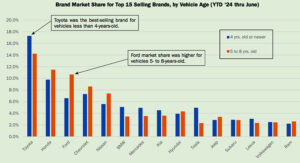California Privacy Protection Agency announced it is conducting a review under the California Consumer Privacy Act, which empowers consumers with new rights
Los Angeles—California’s privacy enforcement agency is investigating how car companies that collect personal data — a ballooning multibillion dollar industry — are complying with data privacy laws.
The California Privacy Protection Agency (CPPA) announced it is conducting a review under the California Consumer Privacy Act (CCPA), which empowers consumers with new rights, including the right to know what personal data is collected, the right to delete that data, and the right to stop the sharing or selling of it.
“We’re glad the agency is using its authority to investigate how powerful car companies are collecting and using our personal information under the law. These companies know more about us than we know about ourselves, and they’re the ones in control of our personal information, not us,” said Justin Kloczko, tech privacy advocate for Consumer Watchdog.
As Consumer Watchdog has spotlighted over the past few years, modern cars have essentially become a web browser, vacuuming up reams and reams of personal information on drivers, passengers, and the public. That information includes where people travel, what they like buying, and their racial, economic and health makeup. That information has fed a growing commercial-surveillance apparatus that endangers people’s civil liberties and safety. By 2030, automotive data is projected to be a $400 billion industry, according to McKinsey & Co.
According to their agreements, car companies, including General Motors, Toyota, Ford, reserve the right to collect, use and share data in order to track and market products. Many people sign away with data rights not knowing it because of confusing, legalese-heavy agreements. This includes letting companies track your location.
“Under the California Consumer Privacy Act, geolocation is considered personal information. People have the right to say no to being tracked in their cars but it is unclear if car companies are providing this right,” said Kloczko.
The privacy agency said the issue of connected cars is something that affects lots of Californians, as more than 35 million vehicles are registered in the state.
“The sheer number of vehicles makes it an area that affects all Californians who drive, rideshare, or even walk near a car equipped with these technologies,” said the agency.
The third-party acquisition of personal car data is also a problem. Companies that specialize in data mining have shared information with the Department of Homeland Security and the Los Angeles Police Department. This information includes people’s text messages, location, down to which car doors opened and at what time. Consumer Watchdog investigated the personal data gold rush of the car industry in its 2022 report, “Connected Cars and the Threat to Your Privacy.”










Comments are closed.